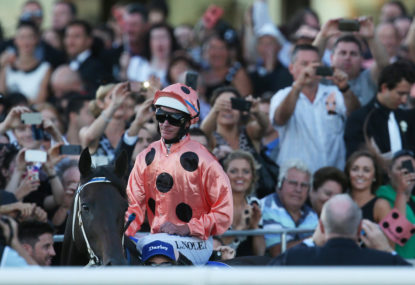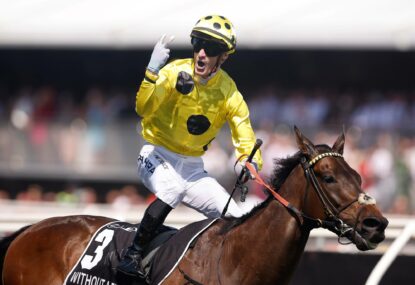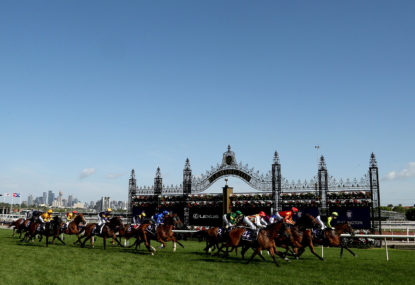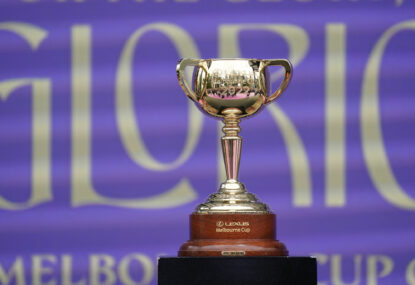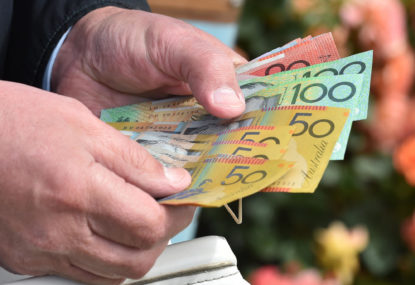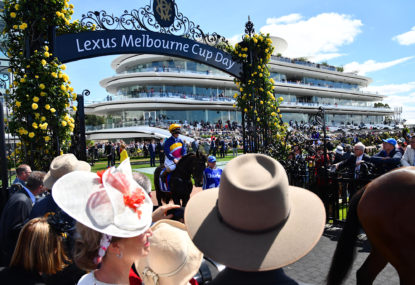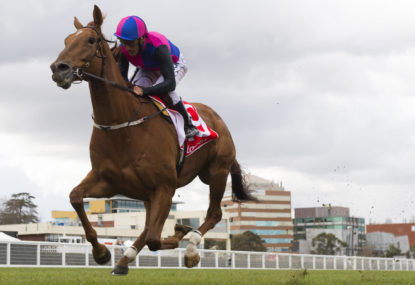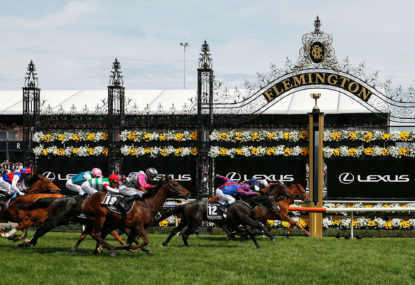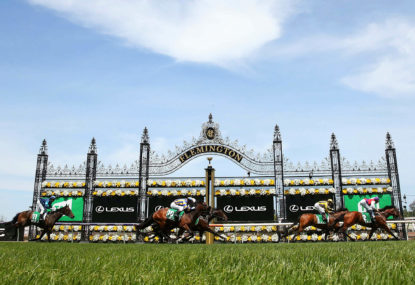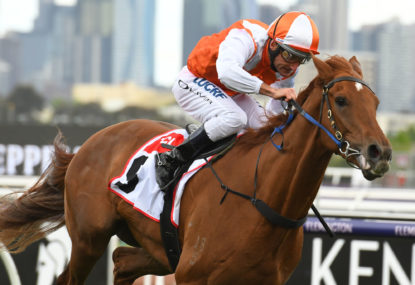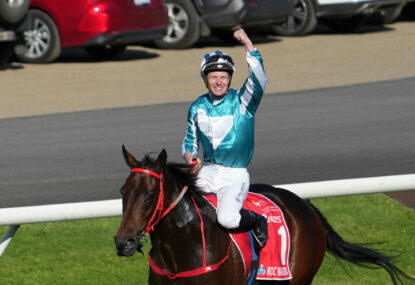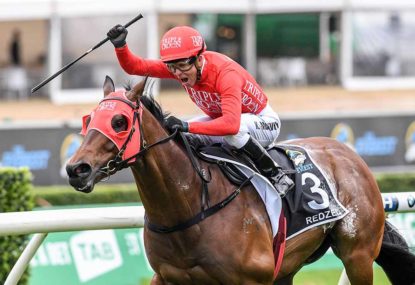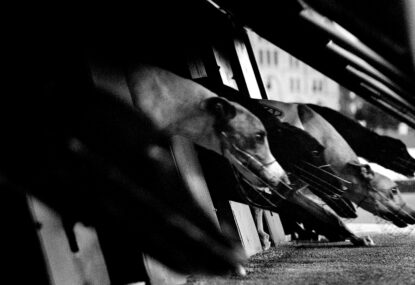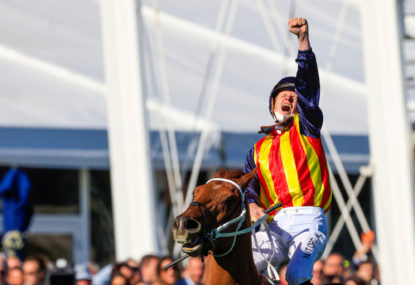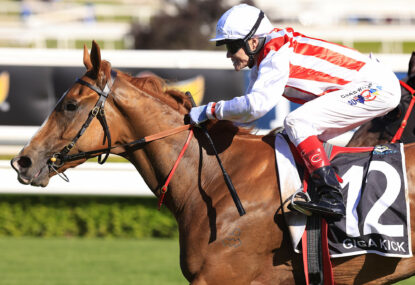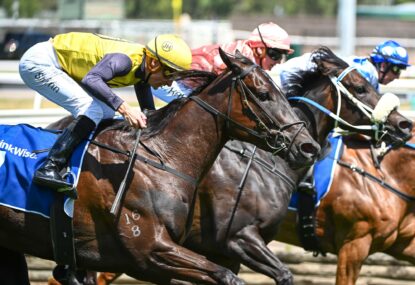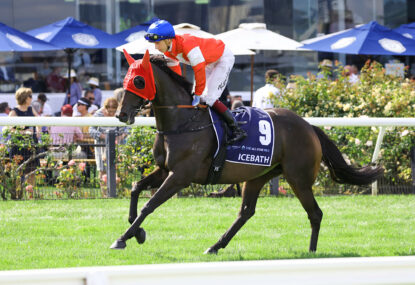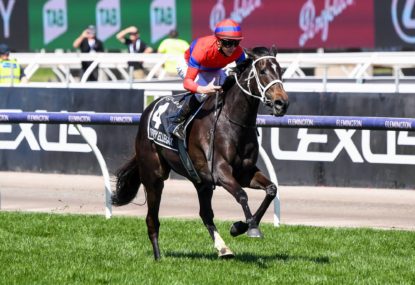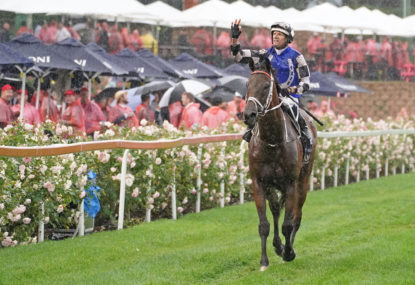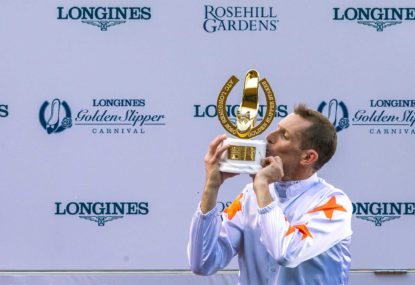Black Caviar will go down in history as one of Australia’s finest racehorses after retiring on April 17, 2013 with the distinction of an unblemished record of 25 wins from 25 career starts.
The beginning
Sired by Bel Esprit and born out of Helsinge on 18 August 2006, Black Caviar was sold to Victorian trainer Peter Moody for $210,000 at the Melbourne Yearling Sale in 2008.
As a two-year-old she won her first trial by five lengths before going onto claim her maiden victory at Flemington in a restricted handicap race by another five lengths and the listed Sapphire Stakes at Caulfield by six.
Black Caviar was piloted both times by Jarrad Noske, one of only three jockeys to ride her during her entire career.
The rise
In 2009 Black Caviar continued to impress as a three-year-old upon returning from a spell, winning the listed Crockett Stakes by another dominant three-length margin. Her next start was in the Group 2 Danehill Stakes at Flemington, when she roared home to beat Wanted by under a length after botching the start.
An injury sustained during that race saw Black Caviar spelled until the new year, when she returned to the track with a 2.5 length win in the Group 2 Australia Stakes, beating home a strong field including Here De Angels. A suspensory ligament injury picked up during the win would mean another spell in the paddock for the rising if somewhat injury-prone talent.
The boom
Black Caviar returned in the spring to claim the Group 2 Schillaci Stakes first-up at Caulfield before destroying the field in the Group 2 Schweppes Stakes, beating home highly rated sprinter Hot Danish by nearly six lengths into second.
The momentum that had been generated from from six-race unbeaten run surged after Black Caviar won the Group 1 Patinack Farm Classic at Flemington on Derby Day again streeting the field under the hold of Ben Melham, who replaced the suspended Luke Nolen.
She would return in February 2011 with the first of three consecutive Group 1 Lightning Stakes victories, finishing ahead of second-placed Hay List, who she would go on to forge a storied rivalry with. Group 1 wins in the Newmarket, William Reid Stakes, TJ Smith Stakes and BTC Cup would cap off a stellar autumn for Black Caviar.
Australia’s best ever?
Now boasting a 13-0 record, Black Caviar began the Spring of 2011 in identical fashion to the year before, notching four and six-length wins in the Schillaci and Schweppes Stakes respectively and claiming back-to-back Patinack Farm Classics with a three-length win over Buffering.
She would return in the new year to cement her status as one of the finest racehorses of all time, winning the Group 2 Australia Stakes for a second time and going on to obliterate her rivals in the Group 1 CF Orr Stakes, Lightning Stakes, Robert Sangster Stakes and Goodwood Handicap, making it 21 wins from 21 starts, an Australian record.
England beckons
Despite her healthy rivalry with Hay List, Black Caviar had destroyed her Australian rivals on such a regular basis that her competitors had been dwindling, with other trainers opting not to race against the champion.
Black Caviar headed to England, where a dream clash with unbeaten English superstar Frankel beckoned.
While the contest never materialised, Black Caviar did claim the Group 1 Diamond Jubilee Stakes by a head in what was the narrowest victory in her career. Luke Nolen had brought Black Caviar to the lead inside the final furlong and began to ease up on the horse in trademark fashion, but a fast-finishing French horse Moonlight Cloud.
After the race it was discovered that Black Caviar had suffered a muscle tear in the race, and connections elected to take the horse back to Australia with the intention of preparing her for the Melbourne Spring Carnival, but later decided against it.
The swansong
In front of sold-out crowds Black Caviar returned to racing in February 2013, winning her third-straight Lightning Stakes at Flemington by 2.5 lengths before scoring by four lengths in the William Reid Stakes.
The 24-0 record of Black Caviar would then be tested in her bid for a second TJ Smith Stakes at Randwick on Golden Slipper Day. Adverse weather conditions in the lead-up to the race had caused her to drift to the relatively long odds of $1.10, but she blew away her rivals at the top of the Randwick straight to claim her 25th straight victory.
The retirement
After a characteristically dominant win in the TJ Smith Stakes many racing fans tipped trainer Peter Moody to continue racing Black Caviar, with a second tilt at Royal Ascot or another Melbourne Spring Carnival campaign the most likely option.
But on 17 April 2013, Moody shocked the racing world when he announced that, after 25 unbeaten victories, Black Caviar would be retired from racing and begin life as a broodmare.
The numbers
Black Caviar’s 1,459-day unbeaten streak claimed nearly 200 horses and included a whopping 15 Group 1 victories, eclipsing the previous mark set by Kingston Town, and the Australian record for the most consecutive victories (25) that stood for nearly 100 years. Black Caviar’s cumulative winning margin stretched to nearly 80 lengths over her 25 wins at an average of 3.18 lengths per victory.
The highest price that Black Caviar started was in her maiden victory at Flemington back in 2009, when she began a $3 favourite. The lowest price that Black Caviar started was in the Group 2 Australia Stakes in 2012, when she was sent out at the price of $1.02. Throughout the majority of the 25 starts she started ‘in the red’ at odds of less than $2, and consistently started at less than $1.10 during the second half of her racing career.
With a timeform rating of 136, Black Caviar is the highest-rated Australian horse in history.





























































































